
The Prison Pet Partnership Program is a model for the nation in the area of the rehabilitation of female offenders within the criminal justice system in Washington State. It began in 1981 with an idea by Sister Pauline Quinn, where inmates would reach out to help others by training special dogs that would assist a disabled person.

This was a cooperative effort among Washington State University, Tacoma Community College and
the Washington State Department of Corrections, trainers and volunteers. This beneficial program
helps inmates at the Washington state Corrections Center for Women learn how to train,
groom and board dogs within the prison walls. The program was later incorporated in 1991 as a
separate not for profit organization. Animals are placed regionally in Washington, Oregon and
Idaho. More than 500 dogs have been placed with handicapped and disabled individuals and
families since the inception of the program.
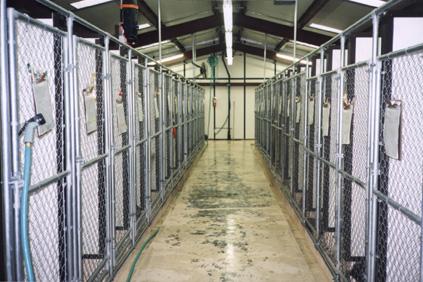
In 1986, the Prison Pet Partnership Program was one of the top ten finalists for Innovations in State and Local Government recognized by the Ford Foundation and the John F. Kennedy School of Business at Harvard University.
In 1997, General H Norman Schwarzkopf came to WCCW to host “What’s Right in America” for NBC. He felt that the Prison Pet Partnership Program exemplified how the prison system can aid in the rehabilitation of inmates while serving the community at large.
Although part of the agency’s funding support is derived through a contract with the Department of
Corrections, it is also supported by Foundations, animal welfare organizations and by individual donors.
A boarding and grooming service for the local community also provides the program with sustaining funding support.
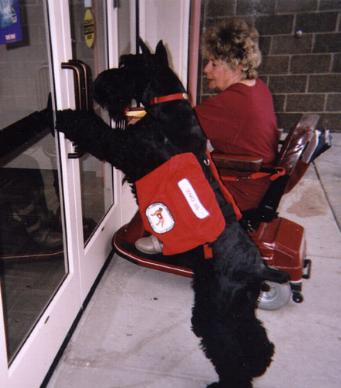
According to Assistance Dog International, the
cost of providing high quality training for
Service/Seizure Alert/Therapy Dogs is
approximately $10,000 per animal. Only one out
of every 15 to 20 dogs selected for the program
has the intelligence and temperament with
Seizure Alerting capabilities are few and far
between. Service Dogs are usually trained over
an 8 to 12 month time frame. Dogs in the
program that lack the necessary temperament to
be trained as Service or Therapy animals are
trained in basic obedience skills that allow them
to be placed in the community as “Paroled Pets”.
All of the animals in the program are taken from
animal rescue organizations, allowing them to lead lives of service rather than be destroyed.

The Prison Pet Partnership Program gives inmate
trainers the opportunity to learn valuable pet
industry-related vocational skills to use in finding
employment when they resume their lives outside
of prison. They are able to work toward Pet Care
Technician certification, levels one and two,
through the American Boarding Kennels
Association. They are also able to obtain
Companion Animal Hygienist certification under
the auspices of the World Wide Pet Supply
Association. At this time, 100 percent of the
inmates who have been released have found
employment. Additionally, over the past three
years the recidivism rate has been zero.
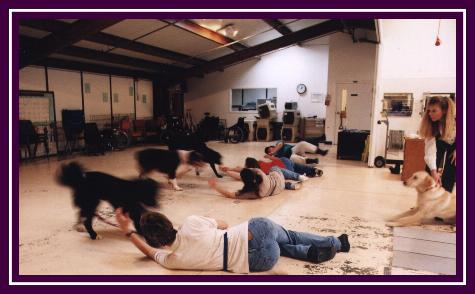
In addition to training, boarding and grooming dogs, inmates also gain clerical skills by working in our
office. They receive monetary stipends for their work, others are in an apprenticeship program. There
are currently 14 inmates involved in the Program. They are required to spend a minimum of two years
with us. The dogs spend a good deal of time with their trainers within the prison community. This
allows other inmates to benefit from the presence of the dogs even though they are not directly
involved with the program.
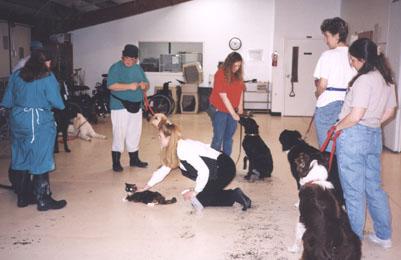
An active policy making volunteer Board of Directors monitors our programmatic progress in cooperation with the staff. Approximately 20 volunteers currently assist us by taking the dogs out into the community for important socialization training prior to placement with heir recipients. This training includes such things as learning to accompany their recipients into elevations, restaurants, doctor’s offices, grocery stores and other facilities.
We work to respond proactively to the needs of individuals who experience seizures, are victims of
illness, such as Multiple Sclerosis, Autism, or who are multi-handicapped, by providing well trained dogs
to assist them. Therapy Dogs are placed with individuals who will benefit from human counseling in
combination with Animal Therapy.
The objectives for the program are:

A capital campaign has allowed the program to expand
the current boarding and grooming business and
generate increased funding support to sustain the
agency. A separate new training facility has been
constructed that will assure that there is sufficient
quality training time for the inmate trainers, recipients
and their dogs.
We also have more adequate office space for our staff
and the inmates who assist the office work. This has
allowed us to increase the number of inmates
participating in the program.
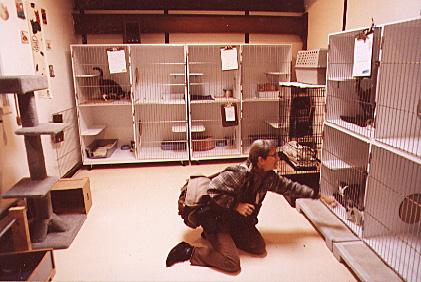
Studies on the human/animal bond reach the not
surprising conclusion that humans need the unqualified love and acceptance that only animals can give.
Animals want to be loved in return. The shared bond between our dogs, their trainers and above all,
their eventual owners provides a feeling of satisfaction that directly contributes to the mental and
physical wellness of all who are involved.
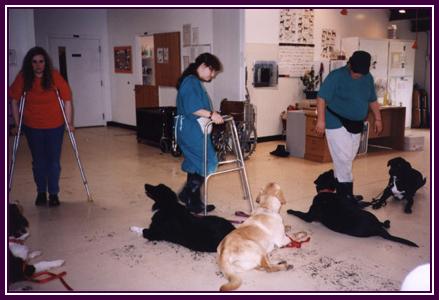
This is the essence of what the Prison Pet
Partnership Program has provided over the years
to the inmates who work with the dogs, the dogs
that are allowed to lead lives of service, the
physically handicapped children, women and men
who receive well trained dogs to enhance the
quality of their lives.
Additional Information on the Web:
Wisconsin Correctional Liberty Dog Program
Prisoners Training Dogs for the Disabled
NEADS
(National Education for Assistance Dog Services)
NEADS Prison PUP Partnership News Articles
Prison Pet Partnership Program Web Page



